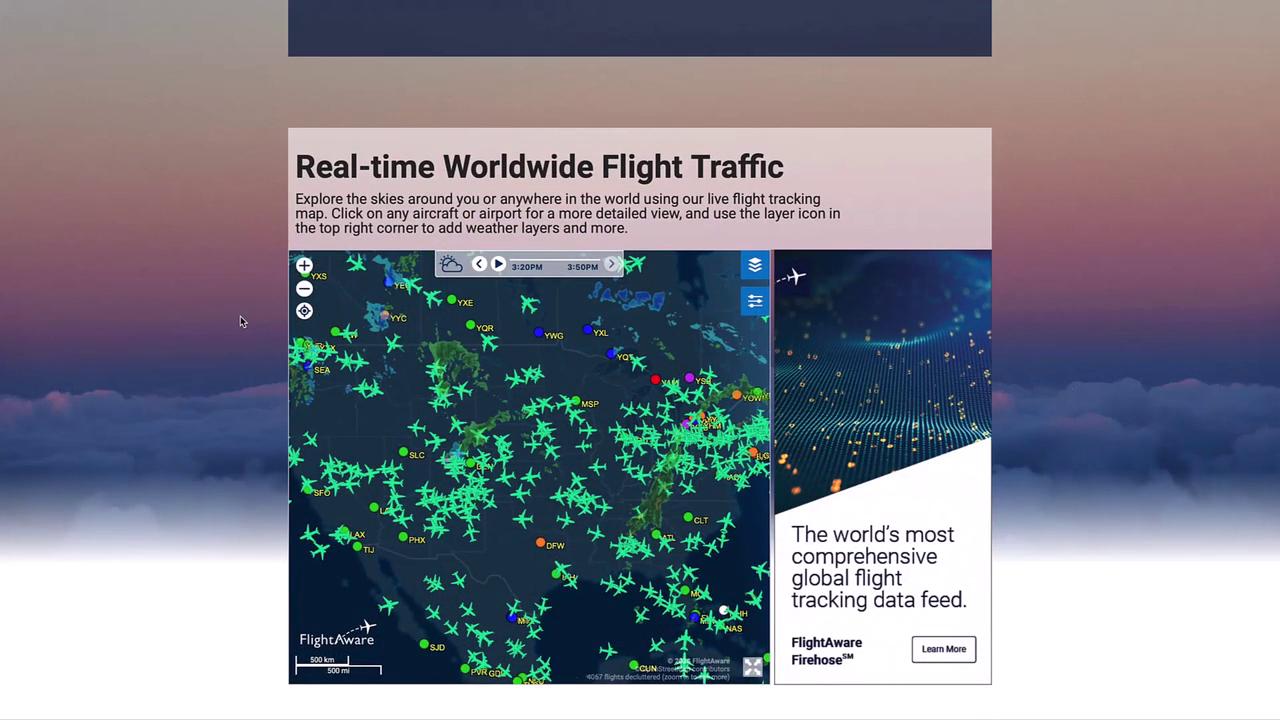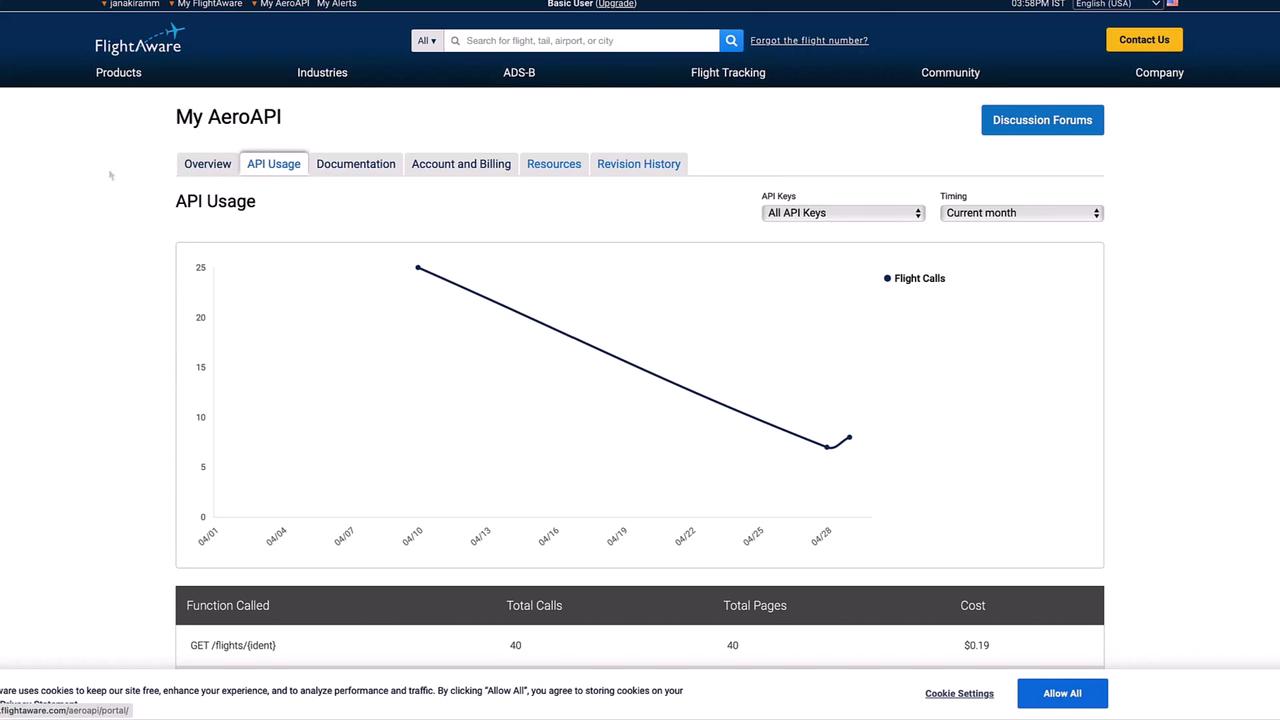LangChain
Building Agents
Building a Real time Flight Agent
In this tutorial, you’ll create an AI agent that delivers real-time flight updates by integrating with FlightAware’s AeroAPI. You’ll walk through:
- Registering and securing your AeroAPI key
- Building a custom LangChain tool for live flight status
- Assembling a React-style agent that uses both your tool and a Python REPL
1. Obtain Your FlightAware API Key
Sign up for a free account at FlightAware to access global flight data:
![]()
Track flights on an interactive map:

Once registered, visit your AeroAPI dashboard, generate a new key, and copy it:

Warning
Keep your AEROAPI_KEY private. Never commit it to version control.
Export the key in your shell:
export AEROAPI_KEY="Your_AeroAPI_Key"
2. Install Dependencies
Use pip to install required packages:
| Package | Purpose |
|---|---|
| requests | HTTP client for API calls |
| pytz | Timezone conversions |
| langchain | Agent framework |
| openai | Chat model integration |
pip install requests pytz langchain openai
3. Create the get_flight_status Tool
Import modules and configure the base URL and API key:
from datetime import datetime, timedelta
import os
import requests
import pytz
from langchain.tools import tool
from langchain.experimental.tools import PythonREPLTool
AEROAPI_BASE_URL = "https://aeroapi.flightaware.com/aeroapi"
AEROAPI_KEY = os.getenv("AEROAPI_KEY")
Define the custom tool to fetch and format flight details:
@tool
def get_flight_status(flight_id: str) -> str:
"""Fetches real-time flight status from AeroAPI."""
def get_api_session():
session = requests.Session()
session.headers.update({"x-apikey": AEROAPI_KEY})
return session
def fetch_flight_data(fid, session):
if "flight_id=" in fid:
fid = fid.split("flight_id=")[1]
today = datetime.now().strftime("%Y-%m-%d")
tomorrow = (datetime.now().date() + timedelta(days=1)).strftime("%Y-%m-%d")
url = f"{AEROAPI_BASE_URL}/flights/{fid}?start={today}&end={tomorrow}"
response = session.get(url)
response.raise_for_status()
return response.json()["flights"][0]
def utc_to_local(utc_str, tz_str):
utc_dt = datetime.strptime(utc_str, "%Y-%m-%dT%H:%M:%S").replace(tzinfo=pytz.utc)
local_dt = utc_dt.astimezone(pytz.timezone(tz_str))
return local_dt.strftime("%Y-%m-%d %H:%M:%S")
session = get_api_session()
data = fetch_flight_data(flight_id, session)
dep_key = next(k for k in ["estimated_out", "actual_out", "scheduled_out"] if data.get(k))
arr_key = next(k for k in ["estimated_in", "actual_in", "scheduled_in"] if data.get(k))
details = {
"source": data["origin"]["city"],
"destination": data["destination"]["city"],
"depart_time": utc_to_local(data[dep_key], data["origin"]["timezone"]),
"arrival_time": utc_to_local(data[arr_key], data["destination"]["timezone"]),
"status": data["status"],
}
return (
f"Flight {flight_id} from {details['source']} to {details['destination']} is "
f"{details['status']} – departed at {details['depart_time']} and arrives at {details['arrival_time']}."
)
3.1 Test the Tool
print(get_flight_status("EK226"))
print(get_flight_status("EK524"))
# Flight EK524 from Dubai to Hyderabad is Scheduled – departed at 2024-04-30 22:00:00 and arrives at 2024-05-01 03:05:00.
4. Build the LangChain Agent
Import agent utilities, register your tools, and define a React-style prompt:
from langchain.prompts import PromptTemplate
from langchain_openai import ChatOpenAI
from langchain.agents import AgentExecutor, create_react_agent
from langchain.experimental.tools import PythonREPLTool
tools = [get_flight_status, PythonREPLTool()]
template = """
Answer the following questions:
You have access to tools: {tools}
Format:
Question: ...
Thought: ...
Action: choose from [{tool_names}]
Action Input: ...
Observation: ...
... (repeat Thought/Action as needed)
Final Answer: ...
Begin!
Question: {input}
Thought: {agent_scratchpad}
"""
prompt = PromptTemplate(
template=template,
input_variables=["agent_scratchpad", "input", "tool_names", "tools"],
)
llm = ChatOpenAI()
agent = create_react_agent(llm=llm, tools=tools, prompt=prompt)
agent_executor = AgentExecutor(agent=agent, tools=tools, verbose=True)
Note
The PythonREPLTool lets your agent execute inline Python code for calculations.
| Component | Role |
|---|---|
| get_flight_status | Custom tool for real-time flight data |
| PythonREPLTool | Executes on-the-fly Python computations |
4.1 Query Flight Status
response = agent_executor.invoke({
"input": "What is the status of EK524? Always include the source and destination."
})
print(response["output"])
# The status of flight EK524 from Dubai to Hyderabad is Scheduled – departed at 2024-04-30 22:00:00 and arrives at 2024-05-01 03:05:00.
5. Calculate Post-Arrival Times
Leverage the Python REPL for follow-up arithmetic, such as booking a cab:
response = agent_executor.invoke({
"input": "If it takes 3 hours in the airport after the arrival of EK524, what time should I book a cab?"
})
print(response["output"])
# You should book a cab at 06:05 AM on May 1st, 2024 after the arrival of EK524.
Under the hood:
from datetime import datetime, timedelta
arrival_time = datetime.strptime("2024-05-01 03:05:00", "%Y-%m-%d %H:%M:%S")
cab_time = arrival_time + timedelta(hours=3)
For 4.5 hours:
response = agent_executor.invoke({
"input": "If it takes 4.5 hours in the airport after the arrival of EK524, what time should I book a cab?"
})
print(response["output"])
# You should book a cab at 07:35 AM on May 1st, 2024 after the arrival of EK524.
Conclusion
You’ve now integrated FlightAware’s AeroAPI with LangChain to build an interactive, real-time flight agent. This pattern—combining a custom tool (get_flight_status) with a Python REPL—enables both external API queries and dynamic calculations. Extend this framework to other APIs for even richer, tool-enabled AI agents!
Links and References
Watch Video
Watch video content